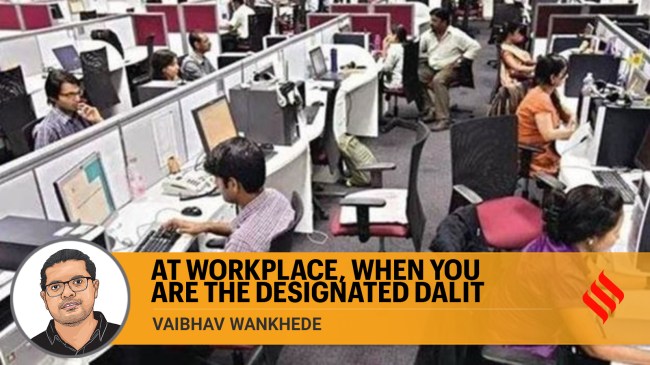Opinion The Designated Dalit in a corporate workplace
Given how polarising things are in our country right now, it would be foolish that an office, where we spend most of our time, can be a safe place for all minorities.
 Corporations should make caste sensitivity a part of the broader organisational training and shape it as an important part of inclusion priorities. And if this seems ornamental, then let’s adopt affirmative action and call for reservations in the private sector. See, made you raise your eyebrows, didn’t it?
Corporations should make caste sensitivity a part of the broader organisational training and shape it as an important part of inclusion priorities. And if this seems ornamental, then let’s adopt affirmative action and call for reservations in the private sector. See, made you raise your eyebrows, didn’t it? It’s Diwali in the office. HR and our bosses ask us to wear traditional clothes for ‘Traditional Day’. I come to work wearing regular jeans and a T-shirt. “Vaibhav, what’s wrong with you? Don’t you have traditional clothes?”
I smile sheepishly. What are traditional clothes for me? The idea of traditional clothing differs from caste to caste. Someone wears a dhoti, someone wears a kurta with red tika on the forehead, someone wears a pathani and so on. What do I wear? The usual vanilla kurta pyjama to blend in? Or be upfront about how my ancestors had to carry a broom tied to their waist to clean their impure footprints?
I have worked at many global companies, where most often I’m the only Dalit person. In the US and other Western societies the excuse goes, “I can’t be racist, I have a Black friend”. In India, it will be, “I can’t be casteist, I have a Dalit friend.” I’m that token Designated Dalit at work. As an entertainment and creative marketing professional, I have had a pretty unusual career. My father, son of a Mahar villager, was a career government officer, because of reservations.
None of my uncles (all from Tier 3 & 4 places) worked in the private sector. The pressure growing up was to take central/state exams and land a government job because of the prestige that comes with it. When that didn’t work out, the next best option was to become a lawyer — there was no one in the family circle who had success in the private sector or owned a business or with traditionally unorthodox jobs, who could guide me. I dropped out of studying law and then grappled up the corporate ladder on my own. Of course, I had some great mentors along the way, but ask my parents what I do, and they still can’t answer without fumbling.
The blooming capitalist society that India is becoming is different from the West. In the West, capitalism thrived because of industrialisation, while in India capitalism thrives because of cheap labour. It is built on the back of the labour class. In the Indian context, capitalism also has surreptitiously worked as an enabler of caste discrimination. And when capitalism manifests itself in the garb of ‘corporate workplace’, the lines get blurred. Calling a Brahmin priest to perform office pooja is commonplace for swanky workplaces. In every big glass office building, which serves as a symbol of ‘Growing India’, there’s usually a Hindu god’s idol at the reception. From having small stickers of gods on the desk of a junior employee to an array of different gods displayed inside the VP’s cabin, religion goes hand-in-hand with work. Only on the outside has corporate India become ‘developed’ but the mindset still remains very medieval. At stake is the identity of the invisible corporate workforce, which often gets overlooked in the larger mainstream order.
Most workplaces pride themselves as spaces that are free of discrimination and full of inclusiveness, diversity etc. But when it comes to caste, they all pretend it does not exist. They deny the very existence of how people from oppressor caste backgrounds still occupy more than 98% of the top management positions. Is there any way to correct this discrepancy?
Corporations should make caste sensitivity a part of the broader organisational training and shape it as an important part of inclusion priorities. And if this seems ornamental, then let’s adopt affirmative action and call for reservations in the private sector. See, made you raise your eyebrows, didn’t it?
Most English-speaking, upper class executives in corporate workplaces have never been exposed to or are unaware of how casteism works. “It only happens in villages, not in offices” goes the common refrain. “You’re overthinking”, just shrug it off and move on. The idea of merit is held supreme, though the factors on which merit is based are conveniently overlooked. And I’ve lost count of the casual remarks of how if someone is incompetent at work, it means they are a ‘quota’ person. And the times I’ve wriggled out of debates on how “reservations should be on economic status”. Also, in any office there’s always a know-it-all who’ll explain how varna and caste are different, and the British corrupted it. Sigh!
Dr. Ambedkar’s most important contribution to the cause of women’s rights was the Hindu Code Bill, which revolutionised property and marriage practices and established laws of maintenance for women. But this is completely excluded from Corporate India. Instead, we have HR initiating in-office mehendi competition and granting early leave for women, for the regressive and chauvinist Karva Chauth.
“Wankhede, huh? What’s your caste?” I was asked in an interview, even before I started working full-time. “You’re a Marathi, and you don’t celebrate Ganpati?” goes another one.
Recently, a senior co-worker saw the book Beef, Brahmins and Broken Men by Dr. Ambedkar on my desk and borrowed it to read. Thirty minutes later, the gentleman exasperatedly returned the book, saying it’s too “left-wing” and offends his sensibilities. “But why do you have it? Are you too?”. I nodded my head. Our daily regular interaction reduced from that day. This gentleman had a corner full of Hindu deities in his cabin and wore the janeyu.
Casteism is so ingrained into daily work lives that it’s become an invisible entity, yet something which is proudly flaunted. Remember the incident where the ex-CEO of Infosys proclaimed, “I’m a Kshatriya, I’m here to stay and fight”, when the news of the rift between the founders and the board broke?
The casteist desecration of urban corporate spaces under the pretext of progressive culture goes by legitimising the dominant religion at workplaces. Wearing religious motifs is ok, as long as one is a Hindu. Threads on wrists, tilak on forehead is considered ‘ normal’ but imagine if a Muslim employee wears a skullcap in office. Will that be unsettling? You might have seen idols of Sai Baba and others on employee desks, but have you ever seen a work desk in a corporate setting with a picture of Dr. Ambedkar? In corporate India, there has been a complete erasure of the Dalit-Buddhist existence. In my last job, the only festive holidays were all for Hindu festivals; none for Ambedkar Jayanti, Eid or even X’mas.
Given how polarising things are in our country right now, it would be foolish that an office, where we spend most of our time, can be a safe place for all minorities.
The writer is a creative and marketing specialist and a cinephile. Suraj Yengde, author of Caste Matters, curates Dalitality, and is currently at Oxford University



